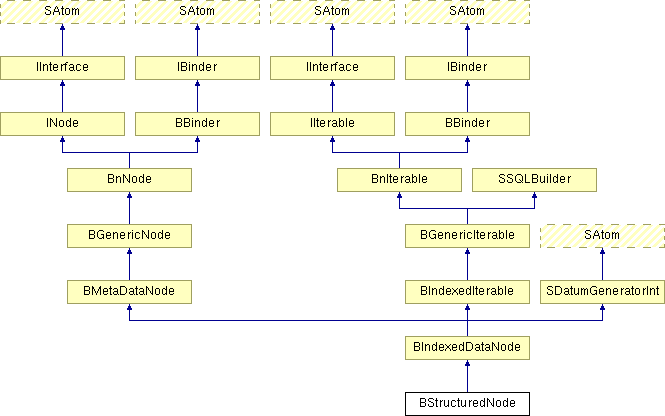
#include <storage/StructuredNode.h>
Inheritance diagram for BStructuredNode:

BStructuredNode is a convenience class that helps you expose data as a node. You'll want to use this class if you want a node with a fixed set of entries, where you supply the data (unlike BCatalog, which allocates and manages the data for each entry itself).
To use this convenience class, make a subclass of it. Into the constructor, pass an array of strings for the names of the entries and the count of those strings. You must guarantee that those c-strings exist for the lifetime of your object. A common way to do that is to make them static global constants, and to include an SPackageSptr in your subclass. That technique will keep your library loaded (and therefore the strings around) as long as one of your objects exists.
To return data from the class, implement ValueAtLocked(). If your data can be changed, you can optionally implement StoreValueAtLocked(). These APIs operate in terms of indices into your name array.
Via BBIndexedDataNode (and its base classes, BMetaDataNode, BIndexedIterable, and SIndexedDatumGenerator), BStructuredNode takes care of generating IDatums as needed, managing IIterators, and the rest of the functionality needed to participate in the Binder Data Model. You can override various other methods of those classes to further customize the behavior of your node, and use BGenericNode::SetMimeType() to customize the MIME type of your node.
Bookkeeping | |
| Creation, destruction, locking, etc. | |
| BStructuredNode (const SContext &context, const char **entries, size_t entryCount, uint32_t mode=IDatum::READ_ONLY) | |
| virtual | ~BStructuredNode () |
Public Member Functions | |
Implement Name Mapping | |
Using array of names, implement APIs to map from names to data indices. | |
| virtual size_t | CountEntriesLocked () const |
| Return the number of entries in your array. | |
| virtual ssize_t | EntryIndexOfLocked (const SString &entry) const |
| Find the index of an entry in your array. | |
| virtual SString | EntryNameAtLocked (size_t index) const |
| Retrieve the name of an entry at an index in your array. | |
Get/Set Entry Values | |
Simplest functions from SIndexedDatumGenerator that must be implement to work with your data. You are free to override other data-related functions on that class for more detailed control. | |
| virtual status_t | StoreValueAtLocked (size_t index, const SValue &value) |
| Default implementation returns B_UNSUPPORTED. | |
| virtual SValue | ValueAtLocked (size_t index) const =0 |
| Must be implemented as per SIndexedDatumGenerator::ValueAtLocked(). | |
|
||||||||||||||||||||
|
|
|
|
|
|
|
Return the number of entries in your array.
Implements BIndexedDataNode. |
|
|
Find the index of an entry in your array.
Implements BIndexedDataNode. |
|
|
Retrieve the name of an entry at an index in your array.
Implements BIndexedDataNode. |
|
||||||||||||
|
Default implementation returns B_UNSUPPORTED. If you override this, be sure to also supply IDatum::READ_WRITE for the mode in your constructor. Implements BIndexedDataNode. |
|
|
Must be implemented as per SIndexedDatumGenerator::ValueAtLocked().
Implements BIndexedDataNode. |